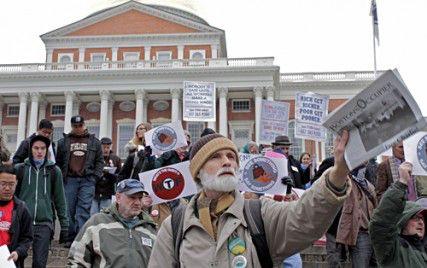
Occupy Boston members and other activists gathered Monday on the steps of the Massachusetts State House to protest the Massachusetts Bay Transportation Authority’s proposed fare hikes and service cuts.
Protesters said the government should be held accountable for the MBTA’s budget deficit. Raising fares would help alleviate the transit system’s fiscal problems, they said, but would unfairly shift the burden to customers.
“Local government needs to take this [debt] off the T. They dumped this on them after the Big Dig,” said Emerson College freshman and Students Against T Cuts member Melanie Ketz. “Now it’s their responsibility to pick this back up and get it paid. I don’t care how but they need to get it done.”
Ketz, along with other members of the Students Against T Cuts group, joined Occupy Boston members for the rally, and about 70 activists participated in total.
The protest marched from the State House to the Massachusetts State Transportation Building, passing Boston Common on its way.
After giving several speeches outside the building, the protesters attended the MBTA’s open forum on the proposed initiatives, leaving their signs outside the building at the security guards’ requests.
After several attempts to contact them, the MBTA could not be reached for comment.
Students Against T Cuts member Zach Tucker, a freshman at Emerson College, said the group shared Occupy Boston’s feeling that “the T is being unfairly influenced by people in government.”
“We’re trying to get the state legislature to reverse its mistakes and properly fund the T, but we are not necessarily following the radical direct action at this point,” he said. “We don’t place any blame on the T management for these cuts because we realize that they are under a crushing financial situation [and] that they ultimately have no choice.”
He agreed part of the MBTA’s problem is the city pushed debt from the Big Dig onto the transportation system in 2000, adding, “the T has been basically broken ever since then.”
The MBTA’s debt is as high as it has ever been, set at about $5.2 billion, and the authority will be working under a $161 million operating deficit in 2012.
In an effort to pay off its debt, the MBTA loses more money annually than “they take in [from] revenue every year,” Tucker said, “so it’s a completely impossible financial situation to resolve.”
Protesters also said a solution is not necessarily easy to find, but the government still needs to take a look at several proposed methods of action.
“If you make a plan and the plan doesn’t work, continuing to do the same thing over and over again and expecting different results is the definition of insanity,” said Mela Bush, a leader in the Greater Four Corners Action Coalition and a member of the On the Move Greater Boston Transit Justice Coalition.
She said Gov. Deval Patrick and the Massachusetts legislature need to “revisit the debt and come up with a solution.”
Bush said taxing gas, using revenue from casinos or seeking support from large corporations or universities are possible ways to fund the MBTA.
The MBTA proposed two scenarios for funding the T in early January.
The first would raise fares by around 43 percent and cut 23 weekday bus routes, among other measures. The second would raise fares by 35 percent and cut 101 weekday bus routes.
Several protesters said these fare hikes would affect some Boston residents more disproportionally than others, especially citizens unable to afford different forms of transportation.
“Studying social work, you begin to understand [how…] public transit really is a public good that benefits everybody,” said Boston University School of Social Work graduate student Jonathan Labrecque. “When you remove that it really reflects the institutional racism of this society.”